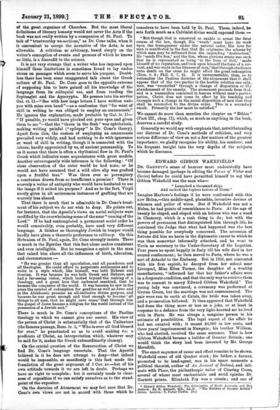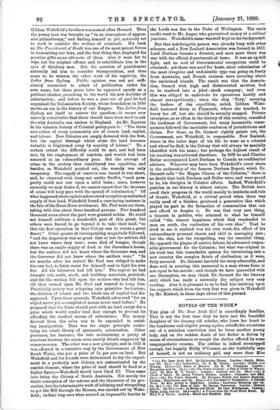EDWARD GIBBON WAKEFIELD.*
Da. GARNETT'S sense of humour must undoubtedly have become damaged (perhaps in editing the Poems of Victor and Cazire) before he could have permitted himself to say that Gibbon Wakefield was the man who- " Launched a thousand ships And sacked the topless towers of Ilium."
Imagine Marlowe's feelings if he were confronted with this new Helen,—this middle-aged, plausible, inventive deviser of schemes and puller of wires. But if Wakefield was not a Helen, he had points of resemblance to Paris. At the age of twenty he eloped, and eloped with an heiress who was a ward in Chancery, which is a rash thing to do ; but with the powers of persuasion that distinguished him through life, he convinced the Judge that what had happened was the best thing possible for everybody concerned. The accession of fortune did him no harm in the diplomatic career to which he was then somewhat informally attached, and he went to Turin as secretary to the Under-Secretary of the Legation. Four years he spent happily in Italy till his wife died in her second confinement ; he then moved to Paris, where he was a sort of Attache to the Embassy. But in 1826, not contented with his first exploit, he decoyed from her school near Liverpool, Miss Ellen Turner, the daughter of a wealthy manufacturer, " informed her that her father's affairs were in a desperate condition, and that the only way to retrieve them was to consent to marry Edward Gibbon Wakefield." The young lady was convinced, a ceremony was performed at Gretna Green, but the marriage was not consummated. The pair were run to earth at Calais, the bride was taken away, and a prosecution followed. It then appeared that Wakefield had done the thing more or less as a joke, or at least in response to a defiance from the very light-hearted set he lived with in Paris. He was always a sanguine person in his estimate of possibilities. The legal aspect of the affair be had not counted with ; it meant £6,000 in law costs, and three years' imprisonment in Newgate ; his brother William, who had abetted, received the same sentence. That is how Gibbon Wakefield became a builder of Greater Britain ; one would think the story had been invented by Mr. George Meredith.
The exact sequence of cause and effect remains to be shown. Wakefield came of old Quaker stock ; his father, a farmer, promoted to be land-agent, was in his spare moments a political theorist, author of An Account of Ireland, and inti- mate with Place, the philanthropic tailor of Charing Cross, several of whose most uncharitable and acrid epistles Dr, Garnett prints. Elizabeth Fry was a cousin ; and one of • Edward Gibbon Wakefield : The Colonisation of South Australia and New Zealand. By ft. Garnett, 0.B., LLD. "The Builders of Greater Britain" Series. London: T. Fisher Unwin. Ds.]
Gibbon Wakefield's brothers was named after Howard. Thus the young man was brought up " in an atmosphere of aggres- sive philanthropy," and finding himself in jail, naturally set to work to consider the welfare of criminals. His book on The Punishment of Death was one of the most potent forces in humanising our laws, and the first thing that displayed his peculiar gifts as an advocate of ideas. Also it went far to wipe out his original offence and to rehabilitate him in the eyes of thinking men. Bat the question of punishment naturally led him to consider transportation, and thus came to be written the other work of his captivity, the Letter from Sydney. Public opinion was not yet suffi- ciently reconciled to admit of publication under his own name, but three years later he appeared openly as a political thinker, preaching to the world his new doctrine of colonisation ; and before he was a year out of gaol be had organised the Colonisation Society, whose foundation in 1830 marks an era in the history of our Empire. The Letter from Sydney set itself to answer the question—it seems now scarcely conceivable that there should have been need to ask it—why Australia was useless to England. As Mr. Egerton in his valuable history of Colonial policy puts it : " The three necessities of every community are of course land, capital, and labour. New Colonies are amply dowered with the first, but the capital through which alone the land becomes valuable is frightened away by scarcity of labour." To a certain extent the difficulty could be met, and had been met, by the employment of convicts, and wealth had been amassed at an extraordinary pace. But the average of crime in the society thus constituted was appalling, and besides, as Wakefield pointed out, the remedy was only temporary. The supply of convicts was bound to run short, and, he observed with irony not unlike Swift's, "such pros- perity could not rest upon a solid basis ; since, however earnestly we may desire it, we cannot expect that the increase of crime will keep pace with the spread of colonisation." Of what happened when capital endeavoured to exploit an unlimited supply of free land, Wakefield found a convincing instance in the fate of the Swan River settlement. Mr. Peel went out there, taking with him about three hundred persons. Five hundred thousand acres about the port were granted to him. He could not himself cultivate a hundredth part of this grant, but others were forced to go beyond it to take their land, "so that the first operation in that Colony was to create a great desert." Other grants of corresponding magnitude followed, " and the dispersion was so great that at last the settlers did not know where they were ; some died of hunger, though there was an ample supply of food at the Governor's house, but the settlers did not know where the Governor was, and the Governor did not know where the settlers were." "In six months after his arrival Mr. Peel was obliged to make his own bed, to fetch water for himself, and to light his own fire. All his labourers had left him." The capital he had brought out, seeds, stock, and building materials, perished; and the like mishap fell upon the settlers who had left him, till they turned upon Mr. Peel and wanted to bang him. Practically society was relapsing into primitive barbarism ; the division of labour and the whole use of capital had dis- appeared. Upon these grounds, Wakefield advocated "for an object never yet accomplished means never used before." He proposed that the State should part with no land except for a price which would render land dear enough to prevent its affording the readiest means of subsistence. The money derived from the sales was to be expended in assist- ing immigration. That was the single principle under- lying his whole theory of systematic colonisation. Other provisoes, for instance, the rale maintaining a parity of numbers between the sexes, were merely details suggested by common-sense. The other was a new principle, and in 1831 it was adopted in a tentative way by the Government of New South Wales, who put a price of 5s. per acre on land. But Wakefield and his friends were determined to try the experi meat in a perfectly new Colony, not contaminated by the convict element, where the price of land should be fixed at a higher figure,—Wakefield would have liked £2. Thus came into being the Colony of South Australia. Not merely the whole conception of the scheme and the literature of its pro- motion, but the interminable work of lobbying and wirepnlling to get the Bill through the Houses, was carried out by Wake- field ; its final leap over what seemed an impassable barrier in the Lords was due to the Duke of Wellington. The main credit went to Mr. Angas, who guaranteed money at a critical juncture. Wakefield's name was still kept in the background.
But that indefatigable person was already busy with other schemes, and a New Zealand Association was formed in 1837. Lord Durham became a director, and once more there was war with the official departments at home. It was an up-hill fight, and no sort of Governmental recognition could be obtained ; yet there was need for haste, since colonisation of the most irregular and undesirable type was going on freely from Australia, and French cruisers were hovering about the unclaimed islands. The result was that the Associa- tion, framed with high and disinterested motives, had to be resolved into a joint - stock company; and even this was obliged to undertake its operations hastily and almost surreptitiously ; when the ship 'Tory,' carrying the leaders of the expedition, sailed, Gibbon Wake- field hastened down to Plymouth, where she touched, to hurry her off, lest she should be actually stopped. Private enterprise, as so often in the history of this country, remedied the tardiness of Government, but many lamentable conse- quences followed the inevitable confusion of jurisdictions and claims. For these, as Dr. Garnett rightly points out, the Government, not Wakefield, is responsible. New Zealand, where in the latter days of his life he went as a colonist and where' he died, is the Colony that will always be specially identified with his name ; but perhaps the highest result of his teaching was achieved elsewhere. In 1838 he and Charles Buller accompanied Lord Durham to Canada as confidential advisers. Whatever may have been Wakefield's exact share in the authorship of the famous Durham Report, which Dr. Garnett calls "the Magna Charta of the Colonies," there is no doubt that both Durham and Buller were, and were proud to be, his disciples in Colonial affairs. Indeed, Wakefield's position in our history is almost unique. The British have owed their progress in the world mainly to instincts and rule of thumb; Wakefield, at a critical period when there was really need of a thinker, produced a generative idea which played its part in the formation of communities that can now afford to despise it. He was that very rare thing, a theorist in politics, who attained to what he himself called " the utmost happiness which God vouchsafed to man on earth, the realisation of his own idea." That he lived to see it realised was his own work, the effect of his extraordinary personal charm and skill in managing men ; but the idea, not the wireprilling, was the essential thing.
He opposed the plague of convict labour, he advocated respon- sible government for the Colonies ; but what was original in his work was this remarkable system for introducing into a new country the complex fabric of civilisation, as it were, fully matured. Dr. Garnett has told the story admirably, and done well in erecting this memorial to a man whose fame is not equal to his merits ; and though we have quarrelled with one literaryism, we may thank Dr. Garnett for the literary skill which has made a naturally dry subject very easy reading. Also it is pleasant to us to find him insisting upon the support which from the very first was given to Wakefield by Mr. Hinton', in those days editor of this journaL



































 Previous page
Previous page